| |
"The thing about the film industry is that it's all incredibly middle-class, isn't it? The people that who look at it and study it and talk about it – write about it – are middle-class, so they always see films about the working-class as being grim, because the people in the film don't have what they have. I very much get the feeling I'm seeing a different place." |
|
Andrea Arnold in Sight and Sound magazine, 2009 |
When I first read that quote by writer-director Andrea Arnold, before many of her award circuit triumphs, when the buzz surrounding her second film, Fish Tank was already gaining a fair amount of momentum, I remember being incredibly annoyed by it as if it were a personal attack, as if she were speaking to me and me alone. I thought it to be a rather sweeping generalisation, and one that I don't entirely agree with. However, as I read the rest of the article, and considered her opening statement further, I realised what she was actually talking about was the mindset people bring to viewing social realist cinema. It's as rigid and conformist as the boundaries of cinematic frame (more on that later). The words 'gritty' and 'grim' are practically engrained into the brain of every film student, academic and journalist the world over as a shorthand, and for the majority of films, an accurate description of what we see on screen.
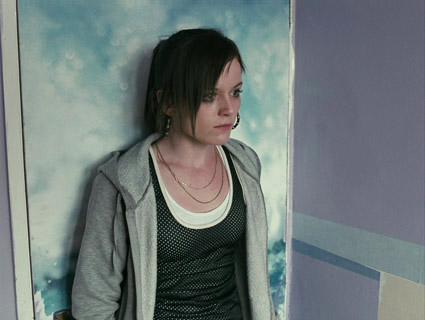
There are, of course, exceptions to this rod of iron rule, and, intriguingly enough, they've only emerged within the last decade in the shape of films work by Lynne Ramsey – there are shades of Ratcatcher and Movern Callar both in Fish Tank – Andrea Arnold herself, and latterly, Samantha Morton's directorial debut, The Unloved, all proof, that even if it isn't always acknowledged – films are ether referred to by their sameness or their difference to something else: to compare is human – that genre does indeed evolve. Looking at that list, you might be wondering if I consider this to be a feminised trait that only a female director could bring that kind of light touch to the material, but that in turn applies that all male directors are heavy-handed and clumsy. Making a judgment like that discounts – to use an in-keeping example – the sublime moments that exist in films such as Pawel Pawlikowski's My Summer of Love. In fact, it's a lot like Arnold's statement about the middle-class dominance within the film industry, it's a reductive one. What's closer to the truth in the case of all these directors, is, as Arnold freely states, they 'see differently.'
And what do we 'see' exactly?
Though Arnold's film might belong to a large milieu – it's Britain's dominant mode of filmmaking after all – Fish Tank isn't anything like other social realist films I've seen, and I've seen a fair amount. On paper, it looks like conventional character-driven coming-of-age tale, set against an urban backdrop, and pushing all the right buttons in regard to honesty and authenticity.
So far, so well-trodden.
I went into this film having read of the continual comparisons to Leigh and Loach, and expected something along the lines of Loach's Sweet Sixteen with a feminine slant and a London accent. I braced myself for the following: bleakness, hopelessness, rainy skies, muddy fields, dark street corners, gangs of kids drinking, smoking and generally doing far too much far too young, pandering to every possible negative stereotype, stoking the tabloidal fires of mass moral panic. If like I, you're expecting to see a carbon-copy of all that's gone before; another dour, listless take on adolescent struggle then you're in for a surprise. A big surprise.
What I got was something fresh and uncompromising, with sunny skies to boot. Never has an Essex estate looked so pretty. It's not pretty in the chocolate box, English Heritage, postcard way, more pretty in the way that you can see beauty in your surroundings when it's sunny and have a natural affection for where you grew up, because it's familiar to you, because it's all you know and all you are at once. Sure, high-rises, from the outside at least, are grey and soulless, but inside, it's bright and lively – in the same way that Happy-Go-Lucky has that extraordinary bright palette, though here slightly more muted, in-keeping with the general feel of the film – just like the people that live in them. Yes, they struggle, and live in what most people would describe as poverty, but Arnold never once makes us feel pity for them because of that. Anything we do feel for these characters comes out of their experiences and actions, rather than their environment.
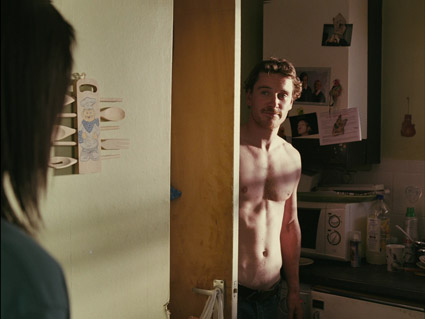
In many ways it's a film that celebrates ordinariness. Arnold presents life or rather, a number of lives as they are without judgment or agenda.
At first glance, fifteen-year-old Mia Williams (an impressive Katie Jarvis, making her film debut), is the poster girl for the ASBO generation. In her hooded top, tracksuit bottoms and trainers, she's every suburban parent's nightmare: loud, rude, and foul-mouthed. If you're sensitive to profanity, you'll immediately want to wash her mouth out with soap, but it'd also wager that if you're so prone, then this film won't be for you. Constantly in scrapes with friend-turned-enemy Keeley (Sarah Bayes), she talks the estate, aimless and sullen-faced, having been kicked out of school, keen to avoid her often self-absorbed mother Joanne (an incredibly powerful Kierston Wareing) and well-meaning intervention of Social Services at any cost. However, still waters, as they say, run deep. Mia might look, walk, talk and act like a stereotype, but over the course of the film, she grows into a fully rounded person before our eyes; but it's a long journey, and one fraught with difficulties. In short, she's her own worst enemy.
Her younger sister Tyler (a wonderful Rebecca Wallis, also making her debut), is no better, and seems intent on following in her sister's footsteps. The two constantly fight with each other, and fight for their mother's attention and affection. No older than eleven, she smokes and drinks in full view of Mia and Joanne with neither of them batting an eyelid. It could be argued that Arnold is trying to manipulate and shock her audience, but like much of the other ‘wrong' behaviour in this film, it doesn't feel like it's there because the director wanted to stir up controversy, it's there because it happens.
The last thread in this rich little tapestry is Connor (a typically fine Michael Fassbender), Joanne's new boyfriend. Though Mia is initially hesitant and rather prickly toward him (you get the feeling he's the last in a somewhat lengthy line), they begin grow closer, and he becomes a much-needed positive figure in the lives of all the Williams women, caring for them in different ways. For Joanne, he's source of support both romantic and financial. For Tyler, he's the father figure she so obviously lacks. From the outset, it seems he's the first of Joanne's partners to take an interest in the girls. Before he integrates into the family proper, he's invited for a house party, and Joanne bans them from coming downstairs, as if she wants to deny their existence, much like Zoe in Arnold's short film Wasp (see below for more details). Later, when Connor attempts to organise an impromptu daytrip, Joanne is resistant, batting off Tyler's pleas and clearly wanting to goad Mia into storming off, meaning Connor's plan falls apart. Mia pulls things back from the brink, taking up his offer, much to Tyler's delight. Although it's obvious she does it to spite her mother – one of her many acts of rebellion – she ends up getting the most from it, and unexpectedly bonds with him, and he becomes something of a mentor to her. The only one to actively encourage her dancing, he's instrumental in getting her to try for an audition she sees advertised in the local shop, lending her the video camera she needs to record her piece.
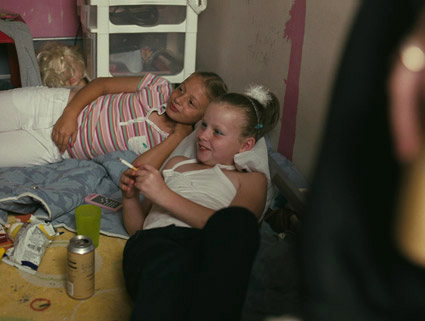
In this bunch of dominant women Connor (and Fassbender) stands out, not only because he's male, but because he's a positive figure. Save for Mia's young traveller friend Billy (an effective Harry Treadaway), who's a rather lovely quiet foil to the loud, antagonistic Mia; he's the only man in their lives. To say anything more about the twists this film takes with Connor and Mia in particular would be unfair, since it's one of the most interesting and difficult aspects of Fish Tank, and like Red Road before it, it's not a film that's afraid to question or push boundaries. Seeing is a key theme of Fish Tank, whether observing or being observed, a thread picked up from Red Road that reaches particularly challenging heights here through Connor.
Arnold has suggested elsewhere that she wishes cinema were braver, and indeed, she leads by example. This is by no means a cowardly or most importantly, given the genre she's working within, predictable film, and Arnold is a director who's not afraid to do things that are contentious or to present behaviour that would be considered in the same terms. Nothing is neat or clear-cut. If you want simple, resolved and nice, then this won't' be to your liking. Her characters are not perfect; they make mistakes and do things that are inexplicable or morally questionable. At times, you'll dislike them, and maybe dislike the film because of it.
The hardest character to like is the character we become most invested in: Mia. From the off, it's clear that this is a girl who doesn't like to do as she's told, won't tow the line, and wants to live her life her own way. Her only real refuge is her dancing, a secret passion which she enjoys in secret, away from prying eyes in nearby empty flat. However, before you settle yourself in for a nice, lovely Billy Elliot-esque storyline where she's discovered and catapulted to stardom, and realises her dreams of dancing and being in a music video for the rappers she so admires, stop hoping, because young Mia isn't afforded a salvation that's as clichéd as that. Even the audition she pins so much on is later unmasked as a rather seedy-looking attempt to recruit girls for erotic dancing. Literally a fish out of water, Mia leaves before she can show any of the steps she's been so diligently rehearsing.
One thing Arnold does share with her oft compared peer, Mike Leigh, is an unusual working method. Shot in continuity, Arnold withheld the film's scripts, giving the actors the parts they needed to see, relatively close to filming, so they learned the story as we do. That freshness and rawness definitely shows up on screen. There's a tension, an energy and an undercurrent that charges through this film and sometimes surges up to the surface. There are moments when that energy burst through to great effect, creating something of a tonal shift, taking the film on a darker path, as in Red Road, and is perhaps an indicator of another Arnold calling-card in the making.
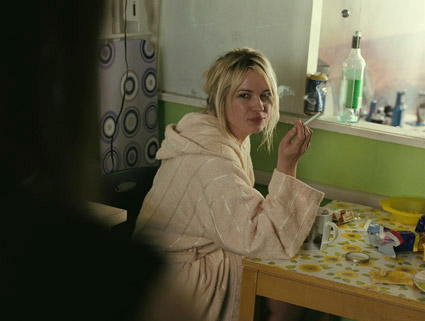
The fact that the film's teenaged leading lady Katie Jarvis was discovered by Arnold after she witnessed an argument between Jarvis and her boyfriend at Tilbury train station makes for great copy, but, thankfully, Jarvis can hold her own, and it means that she plays Mia without a hint of pretentiousness. What you see is what you get. That sounds like I think Jarvis plays the role with little flair, but in truth, it's the opposite. Arnold wanted someone who has lived with knowledge of a life like Mia's, and in Jarvis, that knowledge arrives onscreen, unsullied and innate, but with a surprising amount of skill. What this actress does can't be affected or learned – no matter how closely you adhere to Method rules or how well you mimic – she just is.
Likewise, Kierston Wareing is equally effective. Though this is only her second film role since appearing in Mike Leigh's It's a Free World, she's a television regular, and that experience definitely shows. Sure, Joanne can be fiery, and the teenage, boozing, party-loving girl she once was often makes an appearance and clearly hasn't died – she's old before her time – there's also something terribly there's something quiet, unsettling and damaged about her, that really comes through toward the end of the film and could have been rather melodramatic in different hands.
It's easy to imagine Joanne as a bolder, louder, brassier woman, but where needed, Wareing dials it down, bringing depth to the character, who could have easily been rather flat and easy to vilify. In one particularly heated moment with Mia, she asks what's "wrong with [her]," without a moment's pause, her daughter shouts back down the stairs "you're what's wrong with me." But, Fish Tank isn't Joanne's story, it's Mia's. While it implies that Joanne's lack of mothering – that stems from a lack of knowledge, a result of being thrown in at the deep end, rather than a lack of love – that causes Mia (and a lesser extent Tyler) to be the way she is, some of Mia's problems are of her own making. I don't think it's a coincidence that you can see bits and pieces of Joanne in Mia and Tyler, refracted, flagging up that history repeats itself, and, if they remain the same, her daughters are destined for the same fate.
Outside of its cast, the look and feel of Fish Tank is where it really excels. Arnold finds beauty in strange places, and nothing feels superfluous. There's something almost contemplative about the way we follow Mia around. She walks everywhere, which gives a definite, visceral sense of pace and time passing. When she's tired, from walking too far, running too fast or dancing too long, we feel it. The breaks in action come when Mia sleeps. Consequently, Fish Tank has a real sense of soul and genuine circadian rhythm that's quite bewitching, because you learn to anticipate certain events or patterns in Mia's behaviour, as if she were a person rather than a character. Such is the level of investment Jarvis and Arnold both can engender. One such pattern is her frequent visits to some waste ground outside the estate, where she crosses paths with Billy and his brothers who've made camp there. For her trespass, Mia is tested, set upon by Billy's rowdy, less gentlemanly brothers, who seem to delight in bating Mia just as you might bate a fighting dog. Typically, Mia gives as good as she gets, but is genuinely thankful when Billy releases his dog off its leash, giving Mia an out. Wisely, she takes it, and runs while she can.
Animalistic imagery recurs within the film itself, when on her first visit to the travellers' site, where she encounters an aging, tethered white horse, and tries, over the course of various subsequent visits to set it free, attempting to break the chain with a hammer she's brought from home, during which time her friendship with Billy blossoms, and has someone to share things with and hang around with for what looks like the first time in her life. When they aren't together, she's otherwise alone, and shunned by the other girls from the estate after the fight with Keeley. Mia's affinity with the animal is because she feels the same; that she too is tethered and trapped, wasting away. Arguably, it's a rather obvious parallel – perhaps a little too obvious – but it's a powerful one, much like the image of the wasp, beating itself against the window of the flat. Of course, Mia immediately frees it, opening the window, to allow it to fly out. It speaks volumes that I expected this normally volatile and violent girl to squash the insect and kill it rather than set it free.
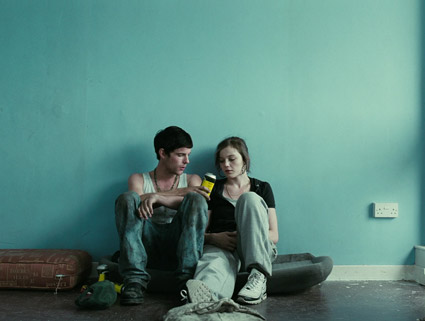
Freedom is perhaps the thing, after motherly love that Mia craves the most, and this is strikingly reinforced by Arnold's use of 4:3 aspect ratio instead of 16:9.* I initially wondered why the director had chosen the format, since in the age of widescreen, smaller ratios are all but outmoded, a reminder of the tiny square televisions that are all over Mia's family's flat. It's a nice little nod, but there's an even bigger reason and a deeper significance the aesthetic decision. It's also an artistic statement. From the second we set eyes on Mia, we can see she's constrained and contained. The frame is her metaphorical tank, and it always feels too small, to the point that it's claustrophobic, and you're praying that Mia will break out of its confines and run at the edges of the frame to push them out and give herself space, like the free runner she's fascinated by in the street.
Interestingly, the US trailer that accompanied its release dispenses with this, cropping the frame for the now more common widescreen format. It's no stretch to say that this seemingly arbitrary choice means that experience of the film would be entirely different, and I believe does the film a great disservice. I'm unsure if the film was also projected in this ratio during its theatrical run, but if it was, I can't imagine it's something Arnold agreed with or even condoned, but it wouldn't be the first time a director's decisions were challenged by a studio. Creative freedom has a price, and one that Arnold is all too aware of.
Awareness and awareness of the self is the biggest theme of Fish Tank and the one that hit closest to home for me, which is probably why I took such offence to Arnold's statements about film and class. Admittedly, reaction to it was knee-jerk one, most probably connected to my own hang-ups about my background – where I live, where I sit in the hierarchy of the supposedly outmoded class system – but it also points toward something that's at the heart of the film: how you see the world versus how you are seen by it.
Fish Tank is the first social realist film that I've genuinely liked, truly and fully in all senses of the word. Yes, sometimes it's dark, sometimes it's intense and sometimes, you feel so involved feel so incredibly sad for the people you're watching, that you wonder why you continue. The character of Mia in particular is one that will resonate with anyone who grew up in similar surroundings. You've either known girls like her; were a girl like her, or, you are her. For me, Fish Tank wasn't about showing the difference between the haves and the have-nots, or lamenting the fact that economics and genetics have dealt Mia (and millions like her) a rough hand in life. This isn't a film about the lack of opportunity, it's about what you do with the opportunities you're given, and no one can accuse Mia of wasting anything she manages to get hold of.
OK, it's framed 4:3, it's low budget and it's British social realist, so we know this is not going to look that great on Blu-ray, right? Wrong. Big time wrong. Fish Tank looks superb here, a razor-sharp transfer with excellent contrast and faithful rendering of its pastel baised colour palette. That there's slightly less punch when the light levels drop is unsurprising, but the picture integrity doesn't falter – when Mia waits in her room at night for her mother and Connor to come home, bathed in the amber of the street light from outside, the colour range may be narrowed and the contrast softened, but the image itself still looks rich and detailed. The use of natural light and minimal fill-in is really well captured here.
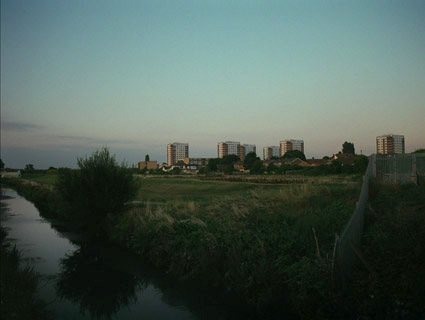
As far as I know the original soundtrack was mixed in stereo and you can choose between LCPM 48 stereo 2.0 track or a DTS-HD Master Audio 5.1 on the Blu-ray. To be honest, except for the track that plays over the closing credits both tracks are stereo only, with nothing at all happening at the back on the 5.1 until the very end. Of the two the PCM stereo track is the best, being just that little bit crisper and louder than the DTS. Both serve their purpose well – this is not a film in need of subwoofer punch and widely spread sound effects.
This is nice little package with a first-rate director-approved 4:3 transfer, one, that if you're still cautious as to whether to make the leap to Blu-ray, really does justify all the hype. The extras can be played by selecting each one individually or through accessing the 'play all' feature. When the latter is selected, they play sequentially in order they appear on the menu screen.
Arnold and Jarvis both cut intriguing figures, and given the groundswell of critical appreciation that surrounds the film, I would have liked some kind of making-of featurette or interview material included here. Given Arnold's unique working methods and clear investment in the project, a commentary track would have been a real bonus. These are minor gripes though, and perhaps flag up how ubiquitous such supplementary material has become. Sometimes, a film is strong enough to stand on it's own without any added baggage, and that's certainly the case here.
Wasp [short film] (24:11)
I was pleased to find Arnold's Oscar-winning 2003 short amongst the extras, since it's very much a companion piece to the main feature. In many ways, Fish Tank can be seen as Wasp's sequel, picking up a decade or so down the line.
The story centres on struggling single mum Zoe (Nathalie Press), living on a Dartford estate. When ex-boyfriend Dave (Danny Dyer) drives by and he wants to catch up, led to believe her young children belong to a friend and she's just taking care of them, he asks her out. Obviously in need of a break, she says yes. Unable to find anyone to baby-sit; she's forced to leave them outside the pub, flitting back and forth between them and Dave. Bringing what she can afford in food and drink from the bar (a glass of Coke and a packet of crisps to share between them), they're left to play in the street.
Wasp is a deceptively simple yet incredibly powerful film that shows a lot of potential, as well as many hallmarks of Arnold's distinctive visual style. Heartfelt, honest and realistic in a way that's quite different from the social realism label Arnold's films are attributed with. In general, short films are sometimes seen as lesser films compared to their feature-length counterparts, but that's certainly not the case here, since it feels as fully conceived as a film three times its length; driven by the strength of Press and Dyer's performances.
Gallery
Photographed by Holly Horner (who also worked on Arnold's previous films Wasp and Red Road), this is a collection of photos taken during the filming of Fish Tank that's surprisingly different from the standard fare, since they err toward the artistic rather than a classic promotional shoot, so they wouldn't feel out of place at a photographic exhibition. Each shot is accessed by pressing the 'next' or 'previous' option with your remote (or mouse), and the fact these aren't presented in a timed slideshow really means you get a chance to look at the images and how they're composed. Lovely.
Trailer (2:27)
Conventional stuff here, with typically dramatic intertitles: 'live,' 'love' and 'give as good as you get'. As we progress, further mentions are also given to Arnold's pedigree, with some well-paced press quotes and further mentions of award nominations. The editing firmly situates Fish Tank in the social realist mould, and relies heavily on music and sound, which is a nice touch given how both are very much present in Mia's life and the landscape of the film itself.
Red Road Trailer (2:00)
Another nice little bonus, which is clearly included for the benefit of viewers introduced to Arnold's work through Fish Tank. Well-paced and with more than enough intrigue, I'd be unsurprised if there was something of a spike in sales for Red Road as a result of it's predecessor's acclaim. It's well worth seeking out if you enjoyed the main feature.
Also included are trailers for several other Artificial Eye releases including Michael Haneke's Hidden and The White Ribbon, along with Ari Folman's Waltz with Bashir and Andrzej Wajda's Katyn.
Fish Tank is, at the risk of sounding cliché, an honest film. As fresh and new as it's young leading lady Katie Jarvis, who gives an incredibly assured performance within an a strong ensemble cast. Heartfelt and intense, this film is unafraid to present modern Britain as it is. Though Arnold may have her fair share of antecedents in Leigh and Loach, Fish Tank is proof that there are different ways of exploring and testing the limits of the genre. She stands up as an intriguing and powerful voice in contemporary British filmmaking, and well-deserving of the praise she's received thus far. Highly recommended.
* For more information on this, click http://www.filmireland.net/2009/09/01/issue-130-–-think-tank/ to read an interview with Fish Tank's cinematographer, Robbie Ryan with Niamh Creely of Film Ireland magazine.
|